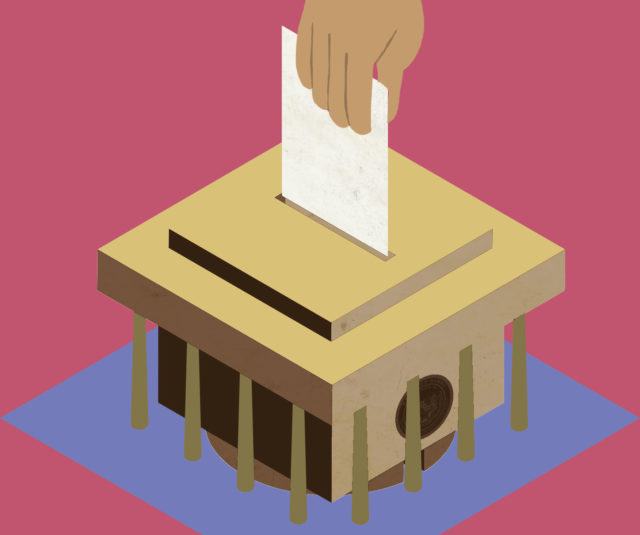Advertisement
The move raises new doubts about whether President Trump’s closest aides will be able to cooperate with the inquiry.

WASHINGTON — A key witness in the impeachment investigation filed a lawsuit Friday asking a federal judge to rule on whether he can testify, a move that raises new doubts about whether President Trump’s closest aides, like the former national security adviser, John R. Bolton, will be able to cooperate with the inquiry.
House Democrats had subpoenaed the witness, Charles M. Kupperman, who served as Mr. Trump’s deputy national security adviser, to testify on Monday. But in an effort to stop Mr. Kupperman from doing so, the White House said on Friday that the president had invoked “constitutional immunity,” leaving Mr. Kupperman uncertain about what to do.
“Plaintiff obviously cannot satisfy the competing demands of both the legislative and executive branches, and he is aware of no controlling judicial authority definitively establishing which branch’s command should prevail,” the suit said.
The implications of the suit, filed in federal court in Washington, extend beyond Mr. Kupperman. His lawyer, Charles J. Cooper, also represents Mr. Bolton and is likely to address congressional requests for his testimony in a similar fashion. House Democrats have had discussions with Mr. Cooper in recent days about Mr. Bolton testifying but have not subpoenaed him.
Democrats believe that Mr. Kupperman and Mr. Bolton could be significant witnesses for their investigation. Unlike several of the administration officials who have already testified, they were both close advisers of Mr. Trump, dealt directly with him on Ukraine policy and could testify about what Mr. Trump said behind closed doors.
Mr. Trump and the White House have attacked many of the career State Department officials who have appeared before investigators on Capitol Hill, calling them “unelected bureaucrats.” But Mr. Kupperman and Mr. Bolton, longtime Republicans, worked directly for Mr. Trump. Mr. Bolton, in particular, is seen as potentially having greater sway with Republicans and independents because of his hawkish views, which he conveyed regularly on Fox News before joining the administration.
House Democrats are investigating whether Mr. Trump withheld aid from Ukraine to pressure the country’s president to conduct investigations that could help him politically. After Mr. Bolton resigned on Sept. 10, Mr. Kupperman took over as the acting national security adviser. The next day, Mr. Trump released the $391 million in aid that he had withheld.
“Constitutional immunity” is essentially executive privilege on steroids. Mr. Kupperman said in the lawsuit that Mr. Trump’s White House counsel, Pat A. Cipollone, had ordered him not to comply with the subpoena. The president’s legal team apparently issued the same advice it had given other former top White House aides, like Mr. Cipollone’s predecessor, Donald F. McGahn II, who had been asked to testify before lawmakers in the spring: They are absolutely immune from being forced to testify to Congress about their official duties, meaning they do not even have to show up.
“The president, however, acting through the White House counsel, has asserted that plaintiff, as a close personal adviser to the president, is immune from congressional process, and has instructed plaintiff not to appear and testify in response to the House’s subpoena,” the lawsuit said.
Administrations of both parties have taken that position. Steven A. Engel, the Trump-appointed head of the Justice Department’s Office of Legal Counsel, asserted in a 15-page legal opinion last summer that “Congress may not constitutionally compel the president’s senior advisers to testify about their official duties.”
Democrats have portrayed that legal theory as extreme and an act of obstruction by the Trump White House. They note that in 2008, a Federal District Court judge, John D. Bates, ruled that President George W. Bush’s former White House counsel, Harriet Miers, had no right to skip a hearing for which she had been subpoenaed. Judge Bates, a Bush appointee, said she had to show up — although she might still refuse to answer specific questions based on a claim of executive privilege.
The executive branch did not appeal the Miers ruling, and because no appeals court weighed in, Judge Bates’s opinion does not count as a controlling precedent for other disputes raising the same issue. That left the Obama administration, in a 2014 memo, free to take the position that Judge Bates had been wrong, and Mr. Engel echoed that logic in his memo as well.
Mr. McGahn defied the subpoena, citing the White House’s instructions, and in August, the House Judiciary Committee filed a lawsuit seeking a judicial ruling that the Justice Department is wrong, and an order requiring Mr. McGahn to testify. That litigation is not yet resolved.
Mr. Kupperman appears to be trying another route. Instead of defying his own subpoena and waiting to be sued, as Mr. McGahn did, he is going to court himself — suing both Congress and Mr. Trump for putting him in what he portrayed as an impossible position, and asking a judge to resolve the legal issue and tell him what to do.
Mr. Kupperman “is faced with irreconcilable commands by the legislative and executive branches of the government and, accordingly, seeks a declaratory judgment from this court as to whether he is lawfully obliged to comply with a subpoena issued by the House defendants demanding his testimony ‘pursuant to the House of Representatives’ impeachment inquiry,’ or he is lawfully obliged to abide by the assertion of immunity from congressional process made by the president in connection with the testimony sought from plaintiff,” it said.
Charlie Savage contributed reporting.



